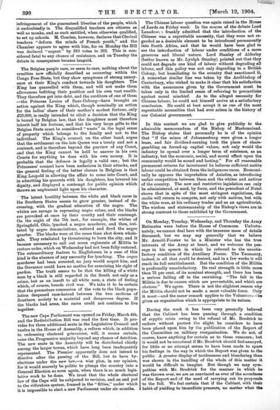In this context we are glad to give publicity to
the admirable memorandum of the Bishop of Mashonaland. The Bishop states that personally he is of the opinion that "if the mines of Johannesburg were given a longer lease, and fair dividend-earning took the place of share- gambling on forced-up capital values, not only would the industry be spread over a longer term of existence, as an industry, but the economic, social, and moral effect upon the community would be sound and lasting." For all reasonable permanent returns for investment he believes sufficient native labour could be obtained from the indigenous races. Economi- cally he opposes the importation of Asiatics, as introducing unfair competition between them and the whites and natives of the country. The new and restrictive legislation can only be administered, at need, by force, and the precedent of Natal shows that in spite of the most stringent regulations, the coolie will return to compete, not only with natives, but with the white man, at his ordinary trades and as an agriculturist. The wisdom and statesmanship of the Bishop's views are in strong contrast to those exhibited by the Government.










































 Previous page
Previous page